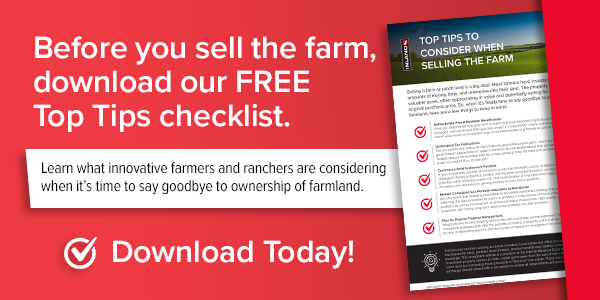1031 Exchanges: A Unique Estate Planning Tool
You have just made one of the most important decisions of your life. You are selling your farm. Finally, after decades of farming the land that has been in your family for generations, retirement is on your horizon, and you need to execute a plan that protects your family’s legacy long after you are gone—no small task.
You would have loved to have one or more of your children continue the family tradition of farming your land, but each made different career choices, and farming wasn’t in the cards. Now comes the question “What do we do with the farm?”
While there are countless factors to consider when transitioning your farmland, there are several time-proven steps you can follow that may help give you the confidence you're doing the right thing and in the right way.
Celebrate your history
Selling the family farm is likely to bring a flood of emotions to the forefront, and giving ample space and attention to how each family member feels about your decision will be time well spent.
A great way to recognize the value of everyone’s thoughts is to start by bringing your family together, including all children who live off-farm. Highlight the memories you have created. Share stories. Celebrate everything the farm has meant to your family over the years.
Discuss your intentions
Explain to your family the reasons why you have decided to sell the farm. Chances are, a key factor was that your children chose to pursue other careers or have moved out of state. With no successor in line to continue farming your land, your focus now shifts to preserving your legacy.
Talk to your family about your plans for retirement and the need for an estate plan that treats everyone fairly. Transparency and open discussions are essential because conflicts and divisions can readily occur among family members when dealing with sensitive issues like which child will care for you and your spouse as you age or how the inheritance will be distributed.
Evaluate your options
If you and your spouse or one of your children want to continue living on your farm, you could consider leasing rather than selling. However, as a non-farming landowner, you still will have responsibilities like ensuring that you find the right tenant farmer who will properly sustain your land’s quality. Rent payments from a long-term lease could provide the retirement income you need.
If remaining on the farm is not a priority, a property sale is likely a good option. A property sale unlocks the unrealized equity in your farm and provides liquidity that can help fund your retirement. But with a sale, there is much to consider, and you’ll need the help of professionals.
Consult with professionals
You need to understand a host of critical tax and financial planning issues before moving forward with a property sale. You must consult with your attorney, accountant, insurance agent, and financial professional, and possibly others, to be sure you know any potential pitfalls that could negatively affect your estate.
Changes to the tax code are not uncommon, which is another reason why estate planning is a fluid exercise requiring professionals attuned to most current laws and regulations.
Explore the 1031 Exchange option
Land rich and cash poor is a phrase often used in reference to the American farmer. You may share in that sentiment with your own situation. So, when selling your farm, you want to capture the greatest value you can. And you want to protect your proceeds from excessive taxation whenever possible.
One approach many farmers have used to reduce tax obligations on a farm sale is with a Section 1031 Exchange. In simple terms, Section 1031 of the Internal Revenue Code allows investment property owners like you to defer capital gains tax by reinvesting the proceeds from a sale in “like-kind” property or properties of equal or greater value.
Interestingly, “like-kind” is a broad definition and includes a variety of property types. For example, you could sell your farm and invest in an apartment complex, a self-storage facility, or an industrial building. The main advantage here is the ability to defer capital gains tax by reinvesting in other income-producing property(ies) that can provide you financial support throughout retirement while preserving the estate for your heirs.
We will discuss the 1031 Exchange option in greater detail in future blog posts. In the meantime, if you would like to learn more about how Inland Private Capital Corporation works with financial professionals to help farmers preserve family farm legacies, fill out the form on the contact us page and a representative will call you within 24-48 hours.
